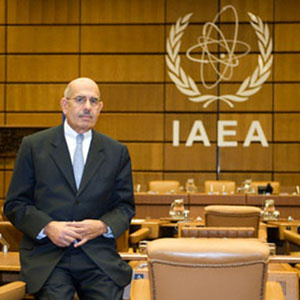What Is the Outcome of El-Baradei’s Visit to Tehran
By Yahya Kousha

El-Beradei’s first-time meeting with Ayatollah Khamenei, while Iran-IAEA negotiations have entered a critical period, increased the importance of this visit.
IAEA Chairman, Mohammad El-Baradei visited Tehran on 11th of January and had serious negotiations with Iranian senior officials.
His first-time meeting with Ayatollah Ali Khamenei doubled the importance of this visit. El-Baradei’s visit has taken place at a time when Iran-IAEA negotiations intended to resolve the remaining problems on the basis of agreed modalities have entered a critical period.
Ambiguities on serious issues such as P1 and P2 centrifuges had been removed previously, thus admitted in El-Baradei’s latest report to Board of Governors and setting ground to resolve the remaining problems. It was after this report that negotiations continued and Deputy to El-Baradei carried on serious, fruitful negotiations.
In Tehran, after meeting Aghazadeh, President of the Atomic Energy Organization of Iran, El-Baradei demanded acceleration of cooperation on Iran’s side. During an interview he said that he had asked Aghazadeh to show maximum transparency and provide guarantees for the entire nuclear activities. During the negotiations Iranian officials stated their commitment to continuation of negotiations with IAEA.
In his meeting with El-Baradei, Ayatollah Khamenei marked some significant issues: firstly, essentially and based on teachings of Islam, the Islamic Republic of Iran is against production and use of nuclear weapons. Secondly, due to the binding nature of international accords, Iran abides by the NPT commitments. Thirdly, there is no reason why Iran’s dossier should remain in hands of the Security Council.
The main reason Iran’s case had been on the agenda in Security Council, was baseless information of Americans, rejected by the NIE report at the ending days of 2007. This makes the third point mentioned by Ayatollah Khamenei more important.
Therefore, on the one hand, invalidity of claims about deviation of Iran’s peaceful nuclear activities, and on the other hand, high-level cooperation between Iran and IAEA, solution of several remaining problems, and Iran’s commitment to clarify other issues, have provided circumstances to return Iran’s nuclear dossier to Vienna. In addition, in his numerous reports, El-Baradei has insisted on non-deviation of Iran’s nuclear activities.
Ayatollah Khamenei’s emphasis on Iran’s disfavor of nuclear weapons based on the teachings of Islam, although not mentioned for the first time, was truly important regarding the situation, since the United States tries to doubt Iran’s intentions in use of peaceful nuclear energy.
In addition to its adherence to NPT regulations that ban obtaining nuclear weapons, Iran has frequently referred to Islam’s opposition to production and use of nuclear weapons as a firm guarantee to non-deviation of its peaceful nuclear activities.
On return of El-Baradei, IAEA announced that in this visit it has been agreed to resolve the remaining problems within four weeks, and the result will be on the March report of Mr. El-Baradei. Referring to this visit and Iran-IAEA negotiations, the spokesman of Foreign Ministry said that Iran is ready to answer all questions, [but] Iran’s case must return to its normal status afterwards.
The most important thing is Iran’s determination to put an end to the remaining problems. In that case IAEA will follow its normal course and Iran will cooperate in the framework of NPT and modular obligations.
However, it seems that the United States will not wait until March and will pursue its attempts to gain the consent of 5+1 group for another sanction resolution and deliver it to the Security Council for approval. Therefore, in the current circumstances Iran’s policy must be intensive negotiations and announcing our country’s readiness for unconditional negotiations with 5+1 countries.

